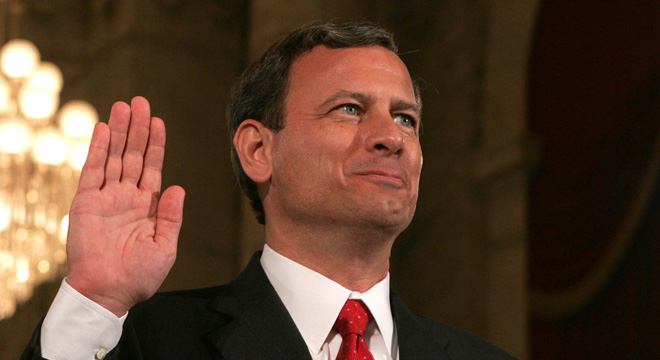In his written opinion on a recent case regarding the constitutionality of suspicionless, forced strip searches of inmates, U.S. Chief Justice John Roberts pointed at one way he could come down on the side of upholding President Obama’s health care law and assuage libertarian fears of federal over-reach, some court-watchers speculate.
The constitutional questions in Florence v. Board of Chosen Freeholders of County of Burlington are different than those in the health care case. But experts see a potential connection in the broader philosophical point Roberts made in his concurring opinion.
Last week the Supreme Court held 5-4 that prisons may strip-search inmates, even those who are jailed for minor infractions, arguing that security concerns trump privacy in such an environment. Roberts wrote a short aside emphasizing that the court may later place limits to that power when necessary. The caveat suggests that Roberts is concerned about tarnishing his court’s legacy by issuing opinions that reflect poorly on his tenure as chief justice in retrospect. And it highlights the fact that future courts can circumscribe federal powers — including the one at stake in the fight over “Obamacare.”
“The Court makes a persuasive case for the general applicability of the rule it announces,” Roberts concluded. “The Court is nonetheless wise to leave open the possibility of exceptions, to ensure that we ‘not embarrass the future.'”
The last three words stuck out to Pulitzer Prize-winning court watcher Linda Greenhouse, who wondered in the New York Times whether something deeper might be at play.
“‘Embarrass the future’? The quote, from a 1944 opinion by Justice Felix Frankfurter in a tax case, is usually offered to mean that the court shouldn’t encumber itself by declaring solutions to problems that have yet to emerge,” she wrote. “Maybe that’s all the chief justice meant. But John Roberts is both a careful prose stylist and a man acutely conscious of his and the court’s place in history. There are so many other ways of expressing a minimalist impulse than this unconventional use of the word ’embarrass’ that I have to wonder whether he didn’t have in mind the prospect of institutional embarrassment, and not only in the case at hand.”
The notion is counterintuitive because in the strip-search case, Roberts sided with the court’s other four conservatives, as the right wants him to do in the Affordable Care Act case. But it’s his larger point about the nature of jurisprudence, as well as his nod to the court’s reputation and legacy, that has other experts thinking along similar lines.
“Nothing would ’embarrass the future’ more than a decision in the health care case [to strike down the law] that’s driven by a concern over a far-fetched broccoli mandate,” said Adam Winkler, a constitutional law professor at UCLA. But unlike Greenhouse, Winkler isn’t convinced Roberts worries much about the legitimacy of the court.
Constitutional scholars have overwhelmingly predicted, for two years, that the “Obamacare” individual mandate will be upheld, because it’s consistent with longstanding precedent and judicial deference to Congress on economic laws. Although public disapproval of the mandate could give cover to Roberts’ legacy if he decides to strike it down, Supreme Court historians say that would ultimately paint the five Republican-appointed justices as partisan actors as opposed to neutral arbiters of the law.
The majority decision in Florence, written by Justice Anthony Kennedy, held that the plaintiff’s 4th Amendment rights were not being violated. But the idea of rubber-stamping blanket strip-searches troubled Roberts — as well as Justice Samuel Alito — enough that he went out of his way to assert that the court reserves the right to carve out exceptions to this rule. It’s a logic that defines the central struggle of the health care case.
The Obama administration argues that the health care market is unique in critical ways that make this mandate necessary and proper — unlike requiring people to buy broccoli or gym memberships — on the grounds that those who fail to purchase insurance impose direct costs on the system. Roberts’ logic in his Florence opinion could hint at one way of upholding “Obamacare” while affirming that the court may later limit what the government can mandate.
“Clearly the court can hold that the mandate is constitutional without deciding about broccoli, or even saying that the health insurance situation is unique,” Timothy S. Jost, a law professor at Washington and Lee University, told TPM. “It seemed to me Justice Kennedy was heading that way by the end of the argument.”
It’s too early — and perhaps too speculative — to say this logic will extend to the health care reform law. But an important context to the Florence opinion is that it was issued after the justices cast their initial round of votes on the “Obamacare” case. And with the four liberal-leaning justices all but certain to vouch for its constitutionality, Roberts is uniquely positioned to determine the outcome. A decision is expected by the end of June.










